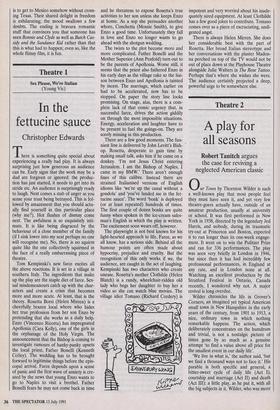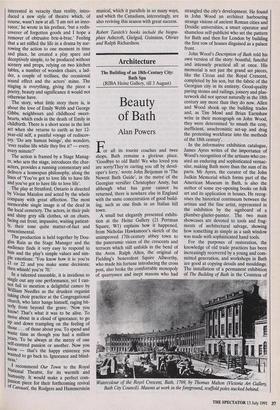Theatre 2
A play for all seasons
Robert Tanitch argues the case for reviving a neglected American classic
Our Town by Thornton Wilder is such a well-known play that most people feel they must have seen it, and yet very few theatre-goers actually have, outside of an amateur production, usually at university or school. It was first performed in New York in 1938, directed by the legendary Jed Harris, and nobody, during its traumatic try-out at Princeton and Boston, expected it to run longer than its one-week engage- ment. It went on to win the Pulitzer Prize and ran for 336 performances. The play was seen very briefly in London in 1946, but since then it has had incredibly few professional performances, in England at any rate, and in London none at all. Watching an excellent production by the Stratford Festival in Ontario, Canada recently, I wondered why not. A major revival is long overdue.
Wilder chronicles the life in Grover's Corners, an imagined yet typical American small town in New Hampshire in the early years of the century, from 1901 to 1913, a nice, ordinary town in which nothing remarkable happens. The action, which deliberately concentrates on the humdrum and trivial, is not a nostalgic picture of times gone by so much as a genuine attempt `to find a value above all price for the smallest event in our daily life'.
`We live in what is,' the author said, 'but we find a thousand ways not to face it.' His parable is both specific and general, a bitter-sweet cycle of daily life (Act I), courtship and marriage (Act II) and death (Act III): a little play, as he put it, with all the big subjects in it. Wilder, who was more interested in veracity than reality, intro- duced a new style of theatre which, of course, wasn't new at all. 'I am not an inno- vator,' he wrote in his preface, tut a redis- coverer of forgotten goods and I hope a remover of obtrusive bric-i-brac.' Feeling that a set stifled the life in a drama by nar- rowing the action to one moment in time and place, he created a play spare and deceptively simple, to be produced without scenery and props, relying on two kitchen tables, a number of wooden chairs, a lad- der, a couple of trellises, the occasional sound effect and the actors' mime. The staging is everything, giving the piece a poetry, beauty and significance it would not otherwise have.
The story, what little story there is, is about the love of Emily Webb and George Gibbs, neighbours and childhood sweet- hearts, which ends in the death of Emily in childbirth. There is a short scene in the last act when she returns to earth as her 12- year-old self, a painful voyage of rediscov- ery. 'Do any human beings', she wonders, `ever realise life while they live it? — every, every minute?'
The action is framed by a Stage Manag- er, who sets the stage, introduces the char- acters, provides a running commentary and delivers a homespun philosophy, along the lines of 'You've got to love life to have life and you've got to have life to love life'.
The play at Stratford, Ontario is directed by Vivian Matalon and acted by the whole company with great affection. The most memorable single image is of the dead in the local cemetery. The actors, in their pale and shiny grey silk clothes, sit on chairs, facing out front, impassive, waiting patient- ly, their tone quite matter-of-fact and unsentimental.
The production is held together by Dou- glas Rain as the Stage Manager and the audience finds it very easy to respond to him and the play's simple values and sim- ple emotions: 'You know how it is: you're 21 or 22 and you make some decisions; then whissh! you're 70.' In a talented ensemble, it is invidious to single out any one performance, yet I can- not fail to mention a delightful cameo by William Needles as the drunken organist taking choir practice at the Congregational Church, who later hangs himself, raging bit- terly from beyond the grave: 'Now you know! That's what it was to be alive. To move about in a cloud of ignorance; to go up and down trampling on the feeling of those . . . of those about you. To spend and waste time as though you had a million Years. To be always at the mercy of one self-centred passion or another. Now you 1(11°w — that's the happy existence you wanted to go back to. Ignorance and blind- ness.'
I recommend Our Town to the Royal National Theatre, for its warmth and humanity. It would make a perfect com- panion piece for their forthcoming revival of Carousel, the Rodgers and Hammerstein musical, which it parallels in so many ways, and which the Canadians, interestingly, are also reviving this season with great success.
Robert Tanitch's books include the biogra- phies Ashcroft, Gielgud, Guinness, Olivier and Ralph Richardson.



















































 Previous page
Previous page